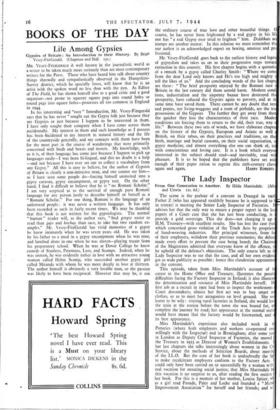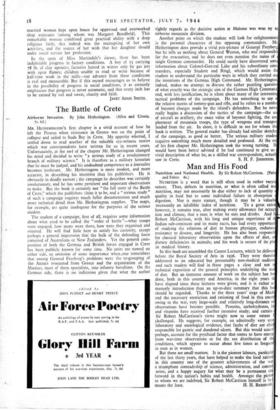The Lady Inspector
From One Generation to Another. By Hilda Martindale. (Alle and Unwin. I25. 6d.) The scene is the parlour of a convent in Donegal in 19o8 Father Z (who has appeared stealthily because he is supposed to in retreat) is meeting the Senior Lady Inspector of Factories. advises her that the only way to ensure a proper report in the loc papers of a Court case that she has just been conducting, is provide a gold sovereign. This she does—not charging it up H.M. Treasury—with excellent results. She has lost the case itse which concerned gross violation of the Truck Acts by proprieto of hand-weaving industries. Her principal witnesses, from of their employers, withdrew their previous statements; the defen made every effort to prevent the case being heard; the Chairm of the Magistrates admitted that everyone knew of the offence, y he upheld all the defence's objections. The only course left to Lady Inspector was to see that the case, and all her own eviden got as wide publicity as possible: hence this clandestine appointme in the convent.
This 'episode taken from Miss Martindale's account of h career in the Home Office and Treasury, illustrates the pecu difficulties facing the Factory Inspector in Ireland; it also illustrat the determination and resource of Miss Martindale herself. H first job as a recruit in 19o1 had been to inspect the workrooms Court dressmakers; almost her first act was to buy smart ne clothes, so as to meet her antagonists on level ground. She so, learnt to be wily: visiting rural factories in Ireland, she would lea the train at the station before the town she was bound for, complete the journey by road; her appearance at the normal stati would have meant that the factory would be forewarned, and its best appearance.
Miss Martindale's experience also included work in t Potteries (where both employers and workers co-operated in willingly with the Inspector) and in Birmingham; after some ye in London as Deputy Chief Inspector of Factories, she moved the Treasury in 1933 as Director of Women's Establishments. her last chapters she talks interestingly about women in the Ci Service, about the methods of Selection Boards, about meeti of the I.L.O. But the core of her book is undoubtedly the fi to make recalcitrant employers conform to the Factory Acts. could only have been carried on so successfully by a woman with real vocation for ensuring social justice; that Miss Martindale this vocation is no surprise to us, after reading the first section her book. For this is a memoir of her mother, Louisa Spicer, as a girl read Froude, Paley and Locke and founded a " Mu Improvement Association" for herself and her friends; and as married woman kept open house for oppressed -and overworked shop assistants (among whom was Margaret Bondfield). This remarkable woman combined great practical ability with a deep religious faith; this indeed was the mainspring of her own activities, and the source of her wish that her daughter should make social service her profession.
In the span of Miss Martindale's Career, there has been indubitable progress in factory conditions. A boy of 13 carrying 78 lb. of clay upstairs; factories heated in winter only by gas jets with open flames; children unable to read or write because of half-time work in the mills—our advance from these conditions is real and measurable. But if this record encourages us to believe in the possibility of progress in social conditions, it as certainly emphasises that progress is never automatic, and that every inch has to be earned by toil and sweat, charity and faith. JANET ADAM SMITH.



























 Previous page
Previous page